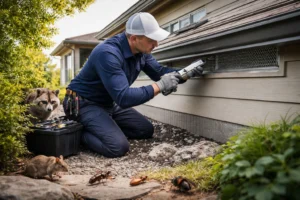Raising goats has been one of the most rewarding experiences of my life. However, it’s not without its challenges. One of the most crucial aspects of goat care that I’ve learned over time is goat deworming. Parasites—both internal and external—can wreak havoc on your goats’ health if not managed properly. In this post, I’ll share what I’ve learned about deworming goats, recognizing signs of parasitic infestations, and the tools and methods that have worked for me.
Why Deworming Goats is Essential

When I first started raising goats, I underestimated the impact of parasites. I quickly learned that goat parasites can lead to:
- Weight loss and poor growth
- Reduced milk production
- Anemia and lethargy
- Skin irritations and itching
Regular goat deworming is vital to prevent these issues and ensure your goats thrive.
Recognizing Signs of Goat Parasites
Over time, I’ve become adept at spotting signs that my goats might be dealing with parasites:
- Weight loss despite a good appetite
- Diarrhea or bloating
- Pale gums or eyelids (a sign of anemia)
- Lethargy and reduced activity
- Scratching, rubbing, or hair loss
If you notice any of these symptoms, it’s time to consider deworming.
Understanding Internal Parasites in Goats
Internal parasites in goats, like Haemonchus contortus (barber pole worm), Teladorsagia circumcincta (brown stomach worm), and Muellerius capillaris (lungworm), can cause severe health issues. These parasites live inside the goat’s body and can lead to:
- Anemia due to blood loss
- Poor digestion and nutrient absorption
- Respiratory issues in severe cases
Regular deworming and pasture management are essential to control these internal threats.
Managing External Parasites in Goats
External parasites in goats, such as lice, ticks, and mites, can cause:
- Itching and discomfort
- Hair loss and skin lesions
- Anemia in severe infestations
I’ve found that maintaining clean living conditions and using appropriate topical treatments can help control these external parasites.
Tools and Methods for Effective Deworming
Over the years, I’ve gathered a toolkit to manage goat deworming effectively:
- Dewormers: I use products like Ivermectin, Albendazole, and Fenbendazole. It’s important to consult with a veterinarian to choose the right dewormer for your goats.
- Dosing Syringe: Ensures accurate administration of oral dewormers.
- FAMACHA Scoring: A method to assess anemia levels in goats by checking the color of their eyelids.
- Fecal Egg Count: Helps determine the level of parasitic infestation and the effectiveness of deworming treatments.
Best Practices for Deworming Goats

From my experience, here are some best practices for deworming goats:
- Rotate Dewormers: To prevent parasite resistance, I rotate between different classes of dewormers.
- Strategic Deworming: I deworm goats that show signs of parasitic infestations rather than deworming the entire herd routinely.
- Pasture Management: I rotate pastures and avoid overgrazing to reduce parasite loads.
- Monitor Regularly: I keep an eye on my goats’ health and perform regular checks for signs of parasites.
Final Thoughts
Managing goat deworming has been a learning process, but it’s one of the most rewarding aspects of goat care. By staying vigilant and proactive, I’ve been able to keep my herd healthy and thriving. If you’re new to goat farming, I hope my experiences can help guide you on your journey.
Remember, each farm is unique, so it’s essential to consult with a veterinarian to develop a deworming and parasite control plan tailored to your specific needs.

FAQs
Deworming should be done at least twice a year, but it depends on your environment. Regularly monitor your goats for signs of parasites and deworm as needed.
Look for symptoms like weight loss, diarrhea, pale gums, lethargy, and excessive scratching. These could indicate internal or external parasite infestations.
Internal parasites, such as roundworms, tapeworms, and barber pole worms, live inside your goats’ bodies and can cause malnutrition, anemia, and respiratory issues.
External parasites like lice, ticks, and mites can be controlled using topical treatments, maintaining clean living spaces, and regular grooming.
Yes, regular deworming helps eliminate parasites that cause weight loss and poor condition, ensuring your goats maintain healthy body weight and growth.
Many dewormers are safe for pregnant goats, but always consult a veterinarian before administering any medication to ensure it’s safe for both the doe and her kids.
A fecal egg count test can help determine the level of parasite infestation in your goats. Regular checks allow you to adjust deworming treatments accordingly.













